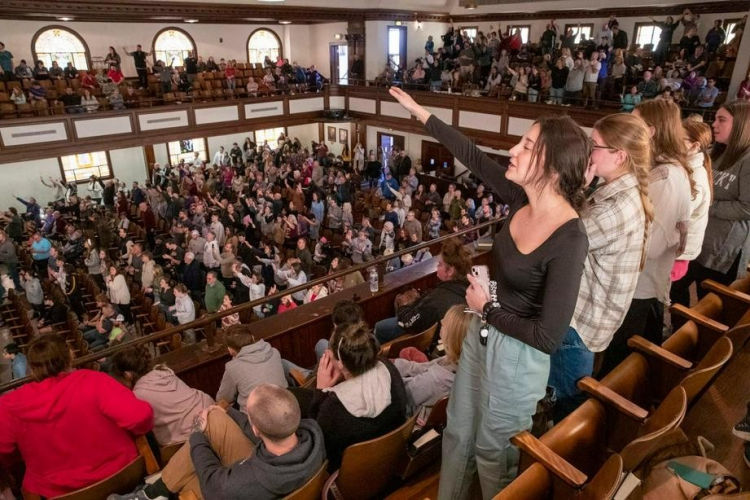From February 8 until the end of the month, a spiritual revival that began with a prayer meeting took place at Asbury University, located in the small town of Wilmore in the suburbs of Kentucky in the southern USA, and attracted the attention of many Christians around the world.
There were also quite a number of pastors in China, especially those in the young adult ministry, who took great interest in and discussed the Asbury Revival.
Sister Xiaomi, a post-90s pastoral worker engaged in prayer ministry, shared her thoughts at a prayer meeting she hosted in early March. She watched the live video of the revival scene at that time carefully and found that the scene was very quiet and orderly. People entered in a very orderly manner and then left quietly after worshiping. Without passionate sermons or a professional worship team, people shed tears and began to repent once they sat there.
"This is very different from regular gatherings, which contain sermons teaching us what to do and how to love and preach the gospel. I think that if there is no repentance, sermons won't make much sense. If people repent from the heart, they will change and be willing to serve. But it’s hard to teach repentance," she said.
When Pastor Xinyang from a church in eastern China, shared with the congregation on this topic, he also emphasized that revival began with a person's true repentance. In comparison to the revival on the outside that we envied, what was more important was our attitude toward God.
When another pastor talked about the Asbury revival, he mentioned what Pastor Jonathan Edwards, who had experienced and led the Great Awakening in American history, thought true revival was. In his book The Distinguishing Marks of a Work of the Spirit of God (1741), Edwards wrote that, to tell between true and untrue revivals, one could look at the marks posed in 1 John: the real Jesus was exalted, the kingdom of Satan was undermined, the Bible was desired more, healthy teachings were advocated, and there was greater love for God and neighbors.
Edwards reminded us that true revival ultimately led people to a deeper and more correct understanding of God. In other words, revival meant returning to the Word of God, experiencing the leading of the Holy Spirit, and living out the testimony of the disciples.
Pastor Elijah, who has been working in the church for decades, began to pay attention to the phenomenon of revival many years ago. He denied the kind of worldly prosperity some prosperity theology pursued.
"Solomon brought material prosperity, but the spirituality of the Israelites did not flourish. For the revival, are we only going after a church full of miracles and turning it into a business to earn money? Do we really love God?"
Moreover, he cautioned that a one-sided emphasis on repentance was also unhealthy: "The revival that Ezra brought was to read the Word of God and call the people to confession and repentance. Churches hold spiritual meetings because they fall easily and because they have sinned. Moses did not bow his head to confess his sins all day long. Samuel and Elijah led others to confess their sins, but they themselves did not confess every day. John rebuked others, and those who repented after listening to John’s preaching did so because they had sinned. I don’t believe Simeon and Anna would resist John when they heard him preach, and I don’t believe they would confess their sins all the time, because they were not in a bad state. They were healthy spiritually. Read the Bible, pray, worship, and live a normal Christian life, and you will not fall into heresies by deception."
He continued, "Not only do you need to lead others to confess their sins, but you also need to teach them the Word of God so that they can check themselves against God's words and understand what they have done wrong... The revival brought about by Ezra was the reading of the Bible because, at that time, they did not obey God’s words. The people of Israel then confessed their sins and repented. Ezra also said, ‘Delight yourself in God, for the joy of the Lord is your strength.’ We must delight ourselves in Christ, the Holy Spirit, and the Word of God, and in reading the Bible, praying, and worshiping, but not just in all the hustle and bustle.”
He summarized that our revival should be built on prayer, worship, reading the Bible, obeying the Word of God, and longing for the Holy Spirit.
"True revival must be built on repentance, prayer, worship, reading the Bible, and obeying the Holy Spirit. A lasting revival would only take place when we pray, worship, read the Bible, obey the Word of God, live a life of inner life, deny ourselves, and carry the cross over a long period of time. Only such a revival would be rooted and not disappear in a flash. But if our hearts are full of unbelief and we want to cut corners and are unwilling to build a normal Christian life for the long term, not wanting to pray, read the Bible, or obey the Holy Spirit, it would be wrong to think that you would get a revival just by attending a conference."
- Translated by Joyce Leung












